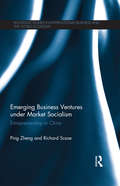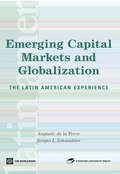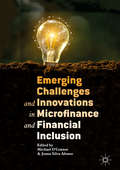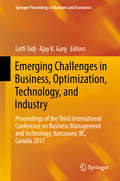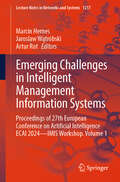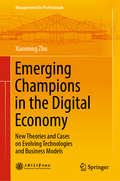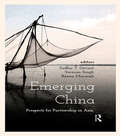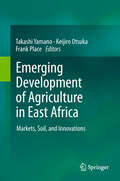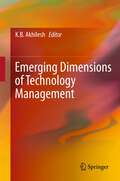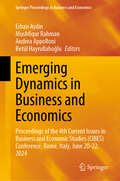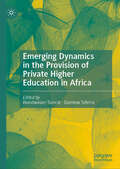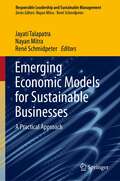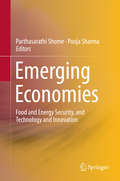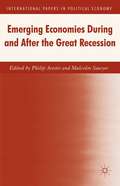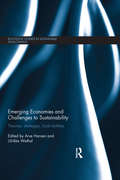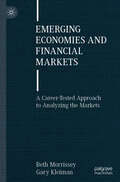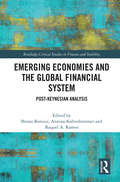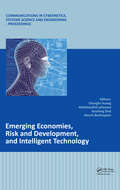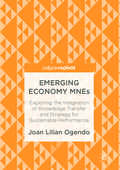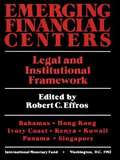- Table View
- List View
Emerging Business Opportunities at IBM (B)
by David A. Garvin Lynne C. LevesqueSupplements the (A) case.
Emerging Business Opportunities at IBM (C): Pervasive Computing
by David A. Garvin Lynne C. LevesqueSupplements the (A) case.
Emerging Business Ventures under Market Socialism: Entrepreneurship in China (Routledge Studies in International Business and the World Economy)
by Ping Zheng Richard ScaseThe rapidly changing market environment in China requires more research to understand fully the empirical processes of management practice and the business landscape in which they operate. Based on longitudinal case study research between 2005 and 2010, this book explores the distinctive characteristics of emerging forms of economic enterprise under market socialism in China. Adopting a holistic view, it explores how rapid environmental and institutional changes in economic reforms are impacting upon their practice, and assesses the role of government policy in shaping their ownership and management processes. Through the changing patterns in the development of business ventures, it outlines the dynamics of industrial and organizational change under the transitional phases of a market socialist economy, and explores the tensions which emerge. This comparative perspective will be of interest to academics, researchers and advanced students of business growth and enterprise management, particularly those wishing to explore China, Chinese business and emerging economies.
Emerging Capital Markets and Globalization
by Sergio Schmukler Augusto De la TorreBack in the early 1990s, economists and policy makers had high expectations about the prospects for domestic capital market development in emerging economies, particularly in Latin America. Unfortunately, they are now faced with disheartening results. Stock and bond markets remain illiquid and segmented. Debt is concentrated at the short end of the maturity spectrum and denominated in foreign currency, exposing countries to maturity and currency risk. Capital markets in Latin America look particularly underdeveloped when considering the many efforts undertaken to improve the macroeconomic environment and to reform the institutions believed to foster capital market development. The disappointing performance has made conventional policy recommendations questionable, at best. 'Emerging Capital Markets and Globalization' analyzes where we stand and where we are heading on capital market development. First, it takes stock of the state and evolution of Latin American capital markets and related reforms over time and relative to other countries. Second, it analyzes the factors related to the development of capital markets, with particular interest on measuring the impact of reforms. And third, in light of this analysis, it discusses the prospects for capital market development in Latin America and emerging economies and the implications for the reform agenda.
Emerging Capitalism in Central Europe and Southeast Asia: A Comparison of Political Economies
by François BafoilThis book examines the emergence of different forms of capitalism in Central-Eastern states in Europe and Mekong states within the Association of Southeast Asian Nations (ASEAN). All of them (but Thailand) have historically disappeared from the regional maps for long periods of time due to colonial or imperial rule. Most of them were previously members of a soviet-type economy, and they all joined ASEAN or the European Union in the 1990s or in the 2000s. These states are characterized by a strong urge toward feelings of national sovereignty due to their experiences with colonialism and imperialism. But, due to the regional economic pressures and the globalization dynamic, these states cannot articulate protectionist policies. They are forced to open their economies in order to attract Foreign Direct Investments. This results in less regulated and more political forms of capitalism than in some more developed capitalist countries. This book analyzes forms of capitalism as the arising from a combination of three conditions: the legacy of the foreign occupations, the national construction process of the sovereign state, and lastly, the dynamics of regional integration. These states' claims to national sovereignty and the manner in which they developed suggests a causative link between the forms of political domination that have presided over these transformations and the forms of capitalism that have resulted.
Emerging Challenges and Innovations in Microfinance and Financial Inclusion
by Michael O’Connor Joana Silva AfonsoThe book is a contemporary compilation of important research in the area of microfinance and financial inclusion. It explores a plurality of views and experiences from different parts of the world while linking a variety of international research backgrounds. Accordingly the book will fill a gap in providing a carefully curated cross-sectorial selection of topics relevant to the development finance research community primarily but also industry practitioners who are interested in keeping abreast of developing research. Benefits in this regard also include being able to provide a platform to less established researchers offering them a voice in published form.
Emerging Challenges in Business, Optimization, Technology, and Industry
by Lotfi Tadj Ajay K. GargThis book presents selected papers on Business Management and Technology, focusing on recent research in Business, Optimization, Technology, and Global Issues. Organized in four broad tracks, papers examine Management Challenges in Today's Industry, especially concerning changes in customer demands; Optimization Challenges in Today's Business, looking at efficiency and effectiveness in providing goods and services at affordable prices; Innovation in Hospitality and Tourism; and Technological Challenges in the Era of Globalization. The book covers both production systems and service systems, including the growing area of Information Technology, and also looks at the quality of work life in various sectors of business. It presents a balanced blend of theoretical and practical papers.
Emerging Challenges in Intelligent Management Information Systems: Proceedings of 27th European Conference on Artificial Intelligence ECAI 2024 - IMIS Workshop. Volume 1 (Lecture Notes in Networks and Systems #1217)
by Marcin Hernes Artur Rot Jaroslaw WątróbskiThis book contains the first volume of proceedings of the ECAI 2024 Workshop on Intelligent Management Information Systems (IMIS 2024). IMIS 2024 was part of the 27th European Conference on Artificial Intelligence ECAI 2024, held in Santiago de Compostela from October 19, 2024, to October 24, 2024. The book discusses emerging challenges related to implementing artificial intelligence in management information systems. The main focus is put on machine learning, including deep learning to support business processes, artificial intelligence for financial systems and cryptocurrencies, hybrid artificial intelligence, and multiple criteria decision analysis methods. The book is divided into three major parts covering the main issues related to the topic. The first part presents issues related to application of artificial intelligence in information systems. The second part is devoted to advanced machine learning and data processing methods to support business processes. The third part is devoted to intelligent multiple-criteria decision analysis methods. The book has an interdisciplinary character; therefore, it is intended for a broad scope of readers, including researchers, students, managers, and employees of business organizations, software developers, IT, and management specialists.
Emerging Champions in the Digital Economy: New Theories and Cases on Evolving Technologies and Business Models (Management for Professionals)
by Xiaoming ZhuThis book presents a list of emerging and established companies which have a strong belief in the digital economy and elaborate their unique digital innovations. The companies selected for this book are from a variety of industries, including both Chinese and international leading technology companies such as iflytek, JD.com, IBM and Amazon. A wide range of commercial fields are covered ensuring a comprehensive research on the topic of digital economy, for example Shanghai Center (Construction Management), PPDai(Finance), 3Dmed(Precision Medicine), Children’s Hospital of Shanghai(Medical Service), First Respond (First Aid Service) etc. All cases are presented based on field studies as well as in-depth interviews and are followed by thought-provoking case analysis, which can help readers to better understand the cases from different perspectives. Readers can use this book as a good reference to address challenges and capture opportunities in the context of ever growing digital economy.
Emerging China: Prospects of Partnership in Asia
by Reena Marwah Sudhir T. Devare Swaran SinghThis volume seeks to examine the evolving contours of Asian multilateralism through emerging China and how it is likely to impact on the growth trajectories of Asian countries. From this perspective, it explores the prospects for ‘partnership’ in Asia, especially in terms of China’s engagement with its principal Asian neighbours, especially India. A substantial part of the volume is devoted to debating China–India relations, highlighting their mutual stakes through their economic and security cooperation as well as their engagement with other countries and regional forums. The book furthers the understanding of the rise of China from an Indian perspective while simultaneously locating China’s rise in the economic dynamics of an emerging Asia. The volume offers illuminating viewpoints, analyses and insights from multiple perspectives, mixed with academic rigour and up-to-date information. It will be of interest to those engaged in economics, politics, trade relations, Indo-China relations, foreign policy, area studies, public policy, and strategic studies.
Emerging Development of Agriculture in East Africa
by Frank Place Keijiro Otsuka Takashi YamanoEmerging Development of Agriculture in East Africa offers case studies that find promise in many new innovations. Farmers in Uganda have quickly learned the management of NERICA rice (a new upland rice variety), which is being disseminated in a limited way in the region. Also in Uganda, farmers living in more remote areas have improved access to markets due to the expansion of mobile phones. In Kenya, improved milk marketing systems have increased efficiency and led to tangible increases in the adoption of dairy production technologies. And the adoption of intensive dairy production systems in Kenya and Uganda are providing significant amounts of manure and positively impacting yields of maize and banana.
Emerging Dimensions of Technology Management
by K B AkhileshTechnology is the key driver of business. May it be airport, ICT , smart governance, manufacturing or plantations. Technology management opens up opportunities for the business and help achieve leadership positions. This collection of papers provides a glimpse of issues faced in different sectors. These papers also should inspire more researchers to expand the scope of the subject itself.
Emerging Domestic Markets: How Financial Entrepreneurs Reach Underserved Communities in the United States
by Gregory FairchildThe term “emerging market” refers to a country where incomes are currently low but that is likely to experience rapid growth and increasing economic competitiveness. Identifying emerging markets is important for international development, and for investors they represent intriguing opportunities to reap uncommon gains. Yet many of the characteristics of emerging markets—including demographic shifts, rising educational attainment, and growing urbanization—are also found closer to home, in communities that have been underserved by the existing financial-services system.Gregory Fairchild introduces readers to the rising set of entrepreneurs whose efforts to reach marginalized groups are reshaping the emerging markets of the United States. He explores how minority-owned and community-development institutions are achieving innovations in consumer- and small-business-targeted financial services to further economic development and reduce inequality. Fairchild illustrates these transformative models through compelling narratives: the decision by a Chinese-ethnic credit union to open a branch in a new neighborhood, investment by a minority-led private equity firm in satellite radio for the developing world, and efforts by a community-development-loan fund to bring fresh foods into a food desert in Philadelphia. He analyzes the models of these organizations, measures their successes and failures, and provides suggestions for sustainable growth of similar organizations. Bringing together quantitative research, powerful stories of real-world entrepreneurs, and nuanced insights on public policy, Emerging Domestic Markets offers a vital set of prescriptions for inclusive financial development.
Emerging Dynamics in Business and Economics: Proceedings of the 4th Current Issues in Business and Economic Studies (CIBES) Conference, Rome, Italy, June 20-22, 2024 (Springer Proceedings in Business and Economics)
by Mushfiqur Rahman Andrea Appolloni Erhan Aydin Betül HayrullahoğluThis volume features a collection of selected papers presented at the 4th Current Issues in Business and Economic Studies (CIBES) Conference, held in Frascati (Rome) from June 20-22, 2024. The CIBES Conference offers global perspectives on business and economic research, incorporating analysis at the micro-individual, meso-organizational, and macro-national levels. This book provides a comprehensive overview of contemporary research topics such as sustainable business practices, the impact of digital transformation on global markets, the dynamics of global trade, the future of work, the economic effects of global health challenges, innovation in entrepreneurship, and issues of equality, diversity, and inclusion. Additionally, it proposes frameworks and recommendations to assist organizations and researchers in addressing and managing the complexities of the global business and economic environment effectively. Through this lens, the book seeks to contribute valuable insights and methodologies to the fields of business and economics, serving as a vital resource for academics, practitioners, and policymakers engaged in understanding and navigating the intricate landscape of global business and economic challenges.
Emerging Dynamics in the Provision of Private Higher Education in Africa
by Damtew Teferra Wondwosen TamratThis edited book examines the private higher education (PHE) sector in African countries. Reports suggest that private institutions across the continent outnumber their public counterparts, yet there has been little scholarly investigation into this emerging phenomenon. The book therefore seeks to document, map and analyse key trends and contemporary themes in the PHE sector, as well as chart historical developments, policy and regulatory frameworks. As a whole, it provides the reader with in-depth knowledge, rich perspectives and robust analyses from leading authorities in the field. Contributions from all sub-regions combine thematic issues with shaping discourse on the topic, and the discussions are undertaken in the context of global perspectives. The book will be of interest to academics, researchers, postgraduate students, policy makers, analysts and development partners interested in African higher education and PHE in particular.
Emerging Economic Models for Sustainable Businesses: A Practical Approach (Responsible Leadership and Sustainable Management)
by René Schmidpeter Nayan Mitra Jayati TalapatraThe book discusses new and emerging economic models, that respond to 'Pulling' and 'Pushing' forces. Today we are poised at an interesting juncture, with favourable conditions making it easier to be a sustainable organization acting as a ‘Pulling’ Force and the climate crisis, rise in social-economic equities thereby ‘Pushing’ for urgent action. The book analyses economic models that look at value propositions, creation and capture with ‘People, Planet and Profit’ deeply embedded in each stage of the value chain. The contributions bring out the interplay between new standards, evaluation frameworks, technology innovation and other emerging tools to show how they create a sustainable business. For this, they lean on learnings from successful sustainable businesses. Business leaders will find that this book provides deep insights on improving their existing sustainable practices, and speeding up the transition from linear to circular, narrow stakeholder driven to community driven. For prospective entrepreneurs the book provides the nudge needed to start up a sustainable enterprise. Students and researchers can benefit from real-life examples of how sustainable transformations unfold.The book thus creates an easy guide for those willing to make the transition to sustainability, start a sustainable business and most of all, to motivate those who may not yet be convinced about the long-term sense of taking care of our people and our earth.
Emerging Economies
by Parthasarathi Shome Pooja SharmaThis volume brings together research on development in three major areas of contemporary global relevance: agriculture and food security, energy, and the institutions of national innovation. Covering six of the largest emerging and developing economies (EDEs) in the world, three Asian (China, India and Malaysia), two Latin American (Brazil and Mexico), and one African (South Africa), the book offers insights on how the major EDEs have addressed the complex and increasingly interrelated issues of agricultural growth, food security and access to energy as part of their growth and development experience over the last three decades. Underscoring the broader view of institutions of national innovation capacities, the volume presents the role of domestic policy and macroeconomic fluctuations in shaping the innovation capacities and development policy in these countries. The book is divided into three main parts. Part I addresses agriculture and food security, while Part II focuses on the energy sector, including the importance of clean energy and energy efficiency in improving access. Parts I and II also cover the role of the major sector-specific innovations for increasing productivity and growth. Subsequently, Part III examines the importance of economy-wide institutions of innovation in the context of supporting growth and development.
Emerging Economies During and After the Great Recession (International Papers In Political Economy Ser.)
by Philip Arestis Malcolm SawyerThe International Papers in Political Economy (IPPE) series explores the latest developments in political economy. This twelfth volume presents a collection of eight papers, analysing the emergence and economic problems of the emerging economies during and after the international financial crisis of 2007–8 and the subsequent Great Recession. The contributions range from an analysis of the international financial crisis of 2007–8 in general terms to an analysis of the same but concentrating on the emerging economies, before turning to groups of economies, Arab, African and Eastern European countries, and two relevant but individual countries, namely China and Turkey. This book offers students, scholars, researchers and policy-makers detailed analysis and informed commentary on the origins of the international financial crisis of 2007–8 and the great recession by focusing on its effect on emerging countries.
Emerging Economies and Challenges to Sustainability: Theories, strategies, local realities (Routledge Studies in Sustainable Development)
by Arve Hansen Ulrikke WethalThe rise of emerging economies represents a challenge to traditional global power balances and raises the question of how we can combine sustainability with continued economic growth. Understanding this global shift and its impact on the environment is the paramount contemporary challenge for development-oriented researchers and policy makers alike. This book breaks new ground by combining scholarship on the role of emerging economies with research on sustainable development. The book investigates how the development strategies of emerging economies challenge traditional development theory and sustainability discourses. With regional introductions and original case studies from South Asia, East Asia, Latin America and Sub-Saharan Africa, it discusses how to conceptualise sustainable development in the global race for economic prosperity. What characterises the development strategies of emerging economies, and what challenges are these posing for global sustainable development? How can emerging economies shed light on the global challenges, dilemmas and paradoxes of the relationship between socio-economic improvements and environmental degradation? This book will be a valuable resource for researchers and postgraduates in development studies, geography, economics and environmental studies.
Emerging Economies and Financial Markets: A Career-Tested Approach to Analyzing the Markets
by Gary Kleiman Beth MorrisseyThis first of its kind reference provides insights into the intricacies of assessing vulnerabilities of today's emerging markets. Qualitative and quantitative elements common in public, multinational, and private sector decision-making are explored, as are the range of public and private sector participants including the IMF/World Bank, banks, insurance companies, and mutual and pension funds. Stock, bond, currency, and derivatives markets development and growth are covered using illustrative examples and case studies from the authors&’ firsthand experiences with guidance and assessments in every emerging region, as well as the critical impact of the legal/regulatory environment and benchmarks/indices and credit ratings. The authors draw upon their expertise in working with public and private market participants for more than three decades and offer a historical perspective of the rise in capital flows and investment in emerging economies. Each theme and chapter offers students and industry professionals bottom-line jargon-free examples to illustrate analytical criteria and techniques.
Emerging Economies and the Global Financial System: Post-Keynesian Analysis (Routledge Critical Studies in Finance and Stability)
by Bruno BonizziThis book provides a comprehensive overview of the financial integration of emerging economies through an in-depth analysis of the international monetary system, how it impacts capital flows and exchange rates, and its implications for policy making. The financial integration of emerging economies has been a remarkable development of the past two decades. The growth of cross-border transactions and asset ownership, not least through the accumulation of foreign exchange reserves, has put many of these countries in a more prominent, if still peripheral, position within the global financial system. This has not been a smooth process, as integration has been marked by cyclical waves of capital flows, with financial and currency instability often accompanying the acute phases of these cycles. While conventional economic theory traditionally sees financial integration as a positive development, Post-Keynesian economists, working in the tradition of Keynes, Minsky and Kalecki, have long taken a more sceptical viewpoint. By centring the analysis of financial dynamics on concepts as liquidity, uncertainty, balance-sheet structures and institutions, Post-Keynesian theory highlights the intrinsic character of shocks imposed by financial integration upon emerging economies, and their implications for economic growth and distribution. This book demonstrates that these analyses can be fruitfully used to gain a better understanding of financial (in)stability and economic development in emerging economies as they integrate into the global financial system. This work provides key reading for students and scholars of economics, political economy and finance that are interested in the financial integration of emerging economies, and how the heterodox tradition of Post-Keynesian economics contributes to its analysis.
Emerging Economies, Risk and Development, and Intelligent Technology: Proceedings of the 5th International Conference on Risk Analysis and Crisis Response, June 1-3, 2015, Tangier, Morocco (Communications in Cybernetics, Systems Science and Engineering – Proceedings)
by Chongfu Huang Abdelouahid Lyhyaoui Nesrin Benhayoun Guofang ZhaiRACR is a series of biennial international conferences on risk analysis, crisis response, and disaster prevention for specialists and stakeholders. RACR-2015, held June 1-3, 2015 in Tangier, Morocco, was the fifth conference in this series, following the successful RACR-2007 in Shanghai (China), RACR-2009 in Beijing (China), RACR-2011 in Laredo (US
Emerging Economy MNEs
by Joan Lilian OgendoThis book explores the influence of the modes of knowledge transfer and environmental dynamism on the relationship between strategic actions and the sustainable balanced scorecard measurement of performance. Special emphasis is placed on emerging multinational enterprises in Kenya, a country that is rapidly becoming one of the fastest growing economies in Africa. The chapters address the best strategy for sustainable performance, the integral modes of knowledge transfer on strategy for sustainable performance and the achievement of sustainable performance in dynamic business environments. Providing innovative research on 25 diverse MNEs in Kenya, this book can be used by managers, investors, consultants, researchers and postgraduate students to understand the strategic mechanisms used by these emerging enterprises.
Emerging Economy Responses to the Global Financial Crisis of 2007-09: An Empirical Analysis of the Liquidity Easing Measures
by Etienne B. YehoueA report from the International Monetary Fund.
Emerging Financial Centers:Legal and Institutional Framework
by Robert C. EffrosA report from the International Monetary Fund.

